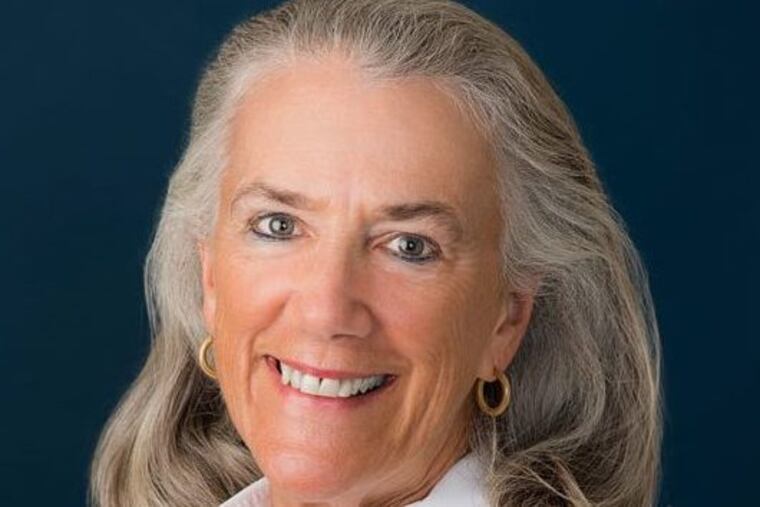Wharton class for multi-millionaires; plus, the Philly 150 nearly beats the Dow
If you're heading into $50 million net worth territory, Wharton has an investment class for you. Charlotte Beyer teaches the $10,000, week-long class to wealthy business owners and families.

If you're heading into $50 million net worth territory, Wharton has an investment class for you.
Charlotte Beyer teaches the $10,500, week-long class to wealthy business owners and families, and if you haven't heard of her, she founded the Institute for Private Investors (IPI), which offers peer-to-peer learning, and authored Wealth Management Unwrapped (Wiley), with a new edition out this year.
Beyer began teaching her Wharton class to high-net-worth investors in 1999, through a partnership between Wharton Executive Education and her San Francisco-based institute. That expanded in 2015 to a second program for financial advisers. Wharton's Private Wealth Management program has enrolled over 1,000 high-net-worth investors since inception.
She teaches the class twice a year – once on Wharton's Philadelphia campus, and once at the school's San Francisco campus. This year's class attracted high-net-worth families from Asia to San Francisco, she noted.
Say you're an entrepreneur who's just sold your start-up or a long-time family business.
"Transitioning from running your business to managing your money looks deceptively easy from the outside," she said. "But I've never met an entrepreneur who sold their business who didn't say it was harder to manage their wealth than to build their business. The business was their passion. Once it's sold, they have to deal with the proceeds, which requires a completely different skill set."
She has participants "work in smaller teams each night on a case study similar to their own situation: a highly successful patriarch sells his company, hires an adviser too quickly, and makes mistakes. Family members are involved, and, inevitably, tensions arise. Participants not only come up with investment plans for the family, but discuss the issues it raises over meals and during breaks."
They also learn to avoid making hasty investing mistakes, such as selling during and after the financial crisis of 2008.
Wharton finance professor Richard Marston notes that faculty also teach during the week-long course, which includes sessions on portfolio management, benchmarking, international diversification, alternative investments including hedge funds and real estate, and Marston's specialty, stocks and bonds. A few years ago, Wharton added a private equity expert, Bilge Yilmaz.
"Somebody with $5 million may not invest in hedge funds or private equity. But if you have $50 million or $100 million, families like that likely will invest" in those asset classes, Marston said.
Over half of the students are under 40 now, and half the class in Philadelphia were women, Beyer noted.
"Fathers come with daughters, cousins come together. Sometimes I see a half-dozen family members attend over the years," she said. "Every investor is CEO of My Wealth Inc., meaning that when you're CEO, you make sure all the departments have the best interest of the company at heart. We make sure the mission is clear. Keep track of fees and revenues you're paying and who's working for you."
For more, visit Wharton's website: (https://executiveeducation.wharton.upenn.edu/for-individuals/all-programs/private-wealth-management).
Philly 150 Index
The S&P 500 has climbed 11 percent in 2017 and the Dow Jones industrial average closed above 22,000 for the first time ever Wednesday. Just before Election Day last year, the Dow hovered around 18,000.
So how did local companies stack up against its much larger benchmark? The Inquirer's Philly 150 Index includes the sum of all Philly-area stocks, weighted by market cap. All companies included in the index are either based here or have big operations in the region. Find the Philly 150 on the Business section homepage: http://www.philly.com/philly/business/ticker.
We found that publicly traded companies here outperformed the Dow over the past year – until last month (see chart). The biggest Philly 150 component companies by market cap include: Johnson & Johnson (up 10.5 percent in the past year), JPMorgan Chase (up 46.5 percent), Wells Fargo (up 16.5 percent), Bank of America (up 70 percent), Verizon (down 5.4 percent), Comcast (up 20.7 percent), Merck (up 13.5 percent), SAP (up 26 percent), Boeing (up a whopping 86 percent), and Glaxosmithkline (down 5 percent).
Biggest gainers and losers? Hot sectors included banking and insurance concerns, and building/housing companies. Bryn Mawr Trust gained 48 percent, PNC gained 59 percent over the past year, Hamilton Lane, up 50 percent, and Lincoln Financial 66 percent. Toll Bros. stock gained 44 percent and Omega Flex, maker of flexible industrial gas hoses, up 71 percent. FMC Corp. gained 75 percent. Big gainers also include BioTelemetry, up 61 percent in the year,
Biggest losers over the past year were pharmaceuticals, retail and some REITS, including Teva Pharmaceuticals, down 54 percent and Lannett Co.y, down 44 percent; Urban Outfitters, down 35 percent and PREIT, Pennsylvania Real Estate Investment Trust, down 53 percent.